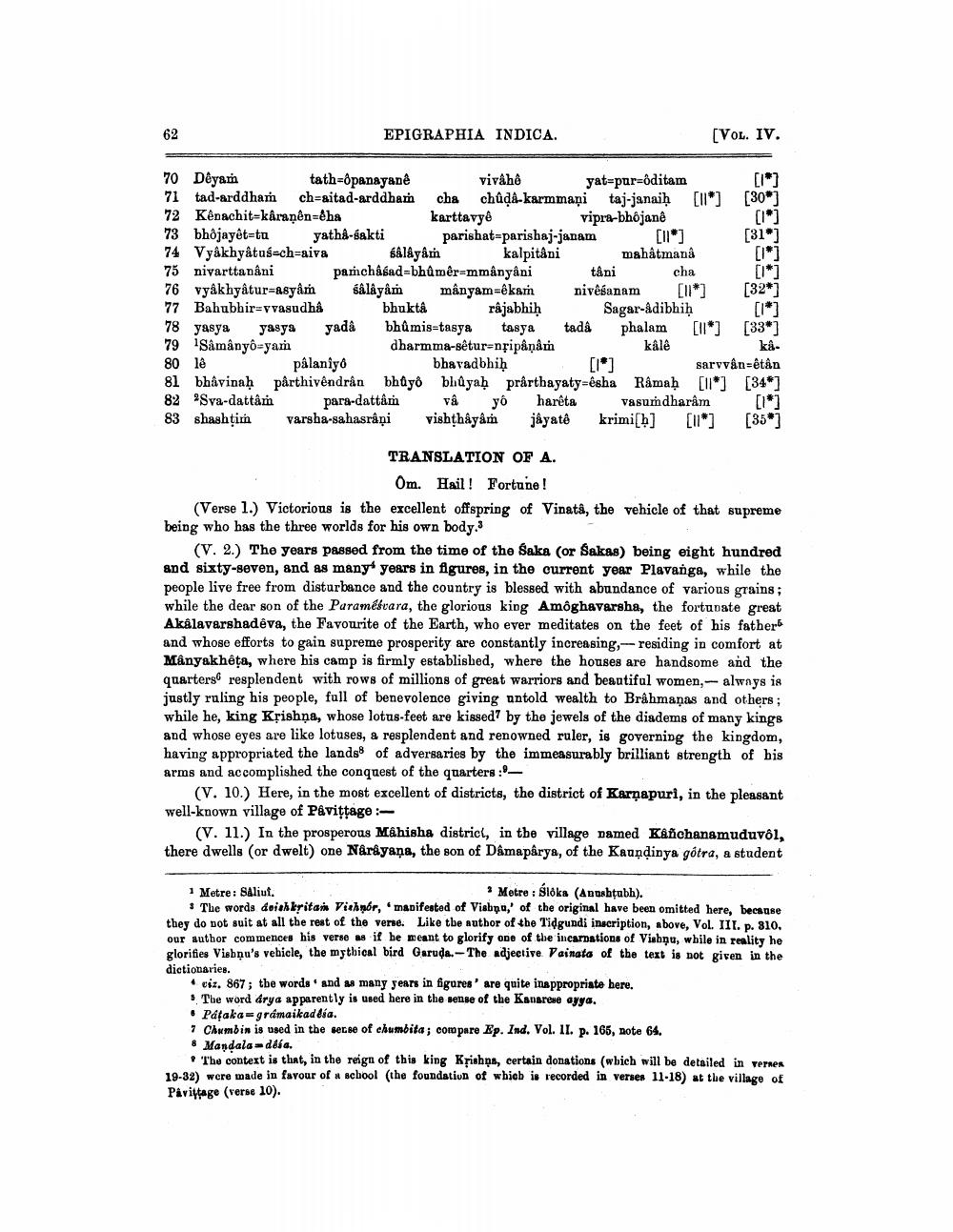________________
EPIGRAPHIA INDICA.
(VOL. IV.
[31]
70 Dêyam
tath=Opanayanê vivahê yat=pur-öditam 71 tad-arddham ch-aitad-arddham cha chûdA-karmmaņi taj-janaiḥ [118] [30"] 72 Kênachit-kêranên=ehs
karttavye
vipra-bhojanê 73 bhôjayotutu y athi-sakti parishat=parishaj-janam [11*] 74 Vyakhyâtus-ch=aiva sålåyå
kalpitáni mahâtmana 75 nivarttanáni pamchâsad=bhû mêr=mmânyâni tåni cha 76 vyakhyâtur=asyâm sâlâyám mânyam=ekam niveśanam [*] [32*] 77 Bahubhir=yvasudha bhukta rajabhiḥ Sagar-adibhiḥ [*] 78 yasya yasya yadà bhůmistasya tasya tada phalam [11*] [33*] 79 Sảmânyo-yam dharmma-sêtur=nsipåņam
k âle 80 lé p ålaniyo bhavadbhiḥ
[lo]
sarvvân-êtân 81 bhävinah pârthivêndrån bhayo bhūyaḥ prårtbayaty-esha Râmaḥ [ll*] [34*] 82 Sva-dattám p ara-dattåm và yê harêta vasundharam [*] 83 shashtim varsha-sahasråņi vishthåyåm jậyatê krimi[h] [11] [35*]
TRANSLATION OF A.
Om. Hail! Fortune! (Verse 1.) Victorious is the excellent offspring of Vinata, the vehicle of that supreme being who has the three worlds for his own body:
(V. 2.) The years passed from the time of the Saka (or Sakas) being eight hundred and sixty-seven, and as many years in figures, in the current year Plavanga, while the people live free from disturbance and the country is blessed with abundance of various grains; while the dear son of the Paramétrara, the glorious king Amôghavarsha, the fortunate great Akalavarshadêva, the Favourite of the Earth, who ever meditates on the feet of his father and whose efforts to gain supreme prosperity are constantly increasing --- residing in comfort at Mânyakhêţa, where his camp is firmly established, where the houses are handsome and the quarters resplendent with rows of millions of great warriors and beautiful women,-- alwnys is justly ruling his people, full of benevolence giving untold wealth to Brahmaņas and others; while he, king Krishna, whose lotus-feet are kissed by the jewels of the diadems of many kings and whose eyes are like lotuses, a resplendent and renowned ruler, is governing the kingdom, having appropriated the lands of adversaries by the immeasurably brilliant strength of his arms and accomplished the conquest of the quarters :
(V. 10.) Here, in the most excellent of districts, the district of Karmapuri, in the pleasant well-known village of Pavittage:
(V. 11.) In the prosperous M&hisha district, in the village named Kanchanamuduvôi, there dwells (or dwelt) one Nariyana, the son of Dâmapârya, of the Kaundinya gótra, a student
1 Metre: Saliut.
* Metre : śloka (Anushțubh). • The words doiak kritan Vishnor, manifestod of Visbqa' of the original have been omitted here, because they do not suit at all the rest of the verse. Like tbe author of the Tidgundi inscription, above, Vol. III. p. 810. our author commences his verse as if he meant to glorify one of the incarnations of Vishnu, while in reality he glorifies Visbnu's vehicle, the mythical bird Garuda.-The adjective Vainata of the text is not given in the dictionaries.
• viz. 867; the words and as many years in figures are quite inappropriate here.
The word drya apparently is used here in the sense of the Kanarese ayya. . Patakargrámaikad día. 7 Chumbin is used in the secse of chumbita; compare Ep. Ind. Vol. II. p. 165, note 64. & Mandala déia.
The context is that, in the reign of this king Krishna, certain donations (wbich will be detailed in vernes 19-32) were made in favour of a school (the foundatiun of whicb is recorded in versen 11-18) at the village of Paviytage (verse 10).




